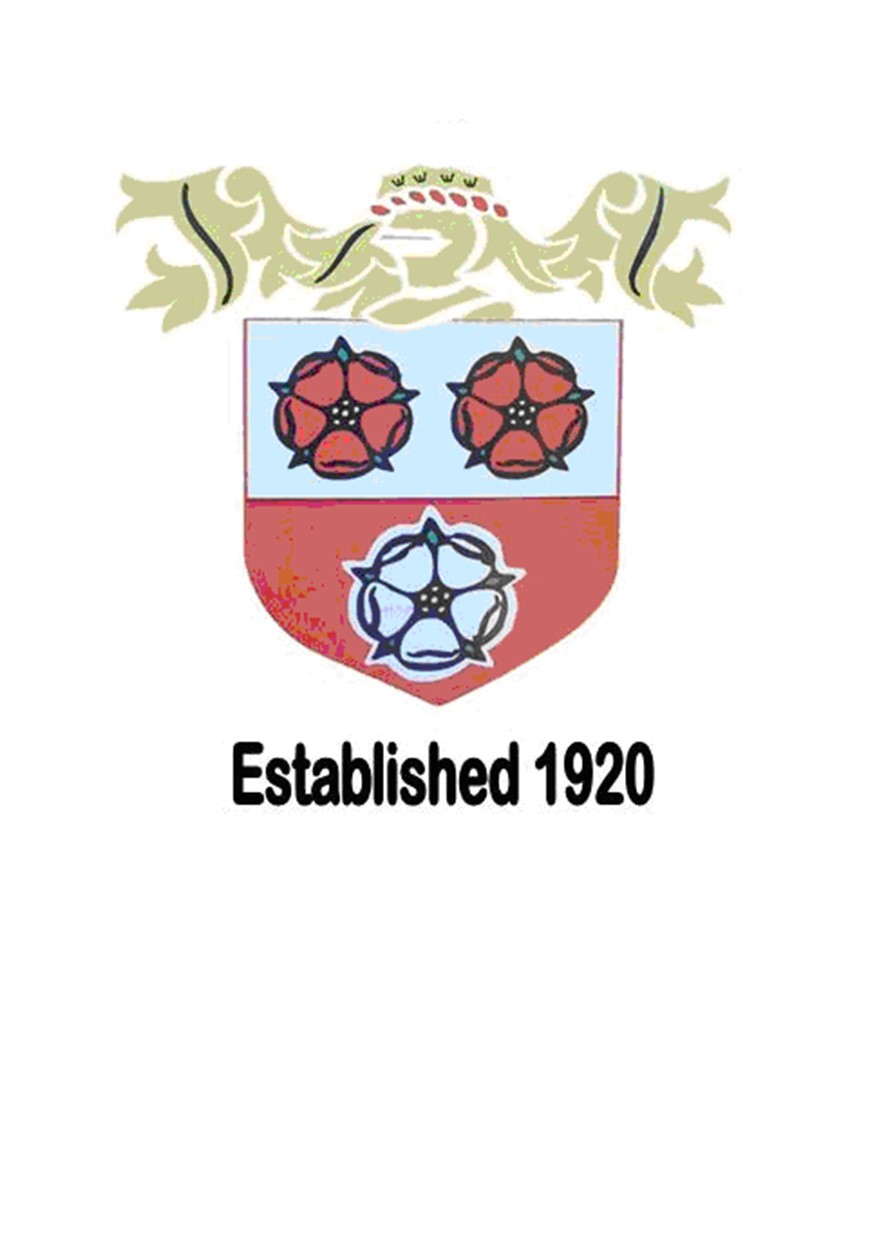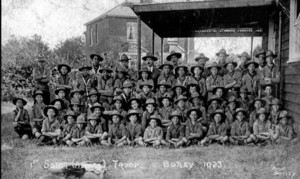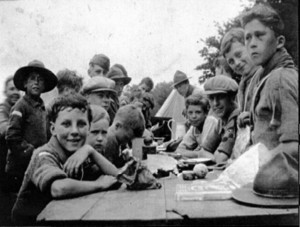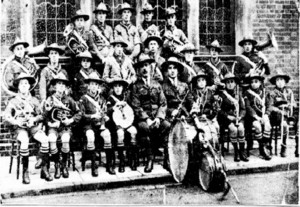1920 to 1953 as Remembered by Ernie Allen
This chapter is drawn from a booklet written called ‘A Brief History of the Southampton Albion Silver Band’ written by E.H.G. Allen in 1953. Ernie was one of the founder members of the Band, and for many years ran the Junior Band.
By presenting this short history of the Band the Committee hope to convey to all members some of the hardships and difficulties that were experienced when the Band was first formed.
The Band originated from the Boy Scouts. It was first known in 1920 as the All Saints Scouts Band. In 1922 it became The Southampton Albion and Scouts Band, having their Headquarters at the Albion Church, St. Marys Road (now Elson’s Transport Warehouse).
Early in 1928 the Band severed its connection with the Scouts, and was re-formed as the Southampton Albion Silver Band, but continued to rehearse in one of the rooms in the Albion Church.
The Band started from scratch with no funds and no regular source of income. A new set of instruments was acquired, setting them in debt by a considerable sum. Several friends of the Band helped with loans to pay the necessary deposit, and all engagements were carried out in ‘Civvies’.
In January 1929 the weekly engagement to play at the ‘Dell’ on a collection basis was offered to the Band by the Southampton Football Club. This was the turning point. The instrument debt was gradually worked down. Then the Band was informed by the Football Club that for the next season, and indeed for future seasons they must turn out in uniform.
This, of course, meant further expense. The members were fitted out with a navy blue uniform, the first engagement in this uniform being a Massed Concert with the Docks & Marine and Thornycroft Bands on the Royal Pier.
By the end of the ensuing season the instrument debt was wiped off. Then began the task of clearing the uniform debt. The members of the Committee and six Deacons of the Church loaned a Pound each to start with. The Bandmaster Mr. A. Halestrap, (now a vice-president), Mr. H.J. Stockwell (Bandmaster of Lockerly Silver Band), and Mr R. Rood (long standing treasurer of the Band) worked really hard on this and finally the object was achieved.
The first Contest in which the Band competed as the Southampton Albion Silver was at Gillingham, Dorset in 1930 when they won ‘B’ Section of the Wessex Association Contest. In 1933 they won both Winter and Summer Contests in ‘A’ section. From then on the Band had many successes in the Contest field.
Up to 1933 the Band was under the baton of Mr. A. Halestrap. After his retirement the Band was taken over by Mr. J. Williamson (late of Besses o’ th’ Barn Band). Both Mr. Halestrap and Mr. Williamson worked very hard for the Band. Their hearts and souls were for the Albion. The members of the Band in those days received no remuneration, only the pleasure of playing in the Band and, in contesting, the honour of being good enough to make the grade. Competition was always very keen for a place in the Band.
Many unique engagements have been carried out. One was at the Stadium in about 1932 when there was a General Election and the results were made known by loudspeakers. This engagement started at 10 p.m. and finished about 3 a.m.
On another occasion the Band turned out at 5 a.m. to meet the Liner ‘Columbia’ at the Docks bringing over German supporters for the International Football Match.
In 1936 a week was spent at Weymouth playing on the Bandstand twice a day. This was the only job of its kind carried out by the Band.
Mr. Williamson died in 1940. Members of the Band not in the Services attended the Funeral. He was well loved by all who knew him.
When preparing for Contests pre-war, members gave up their Sunday mornings for two or three hours to rehearse the Test Piece. The late Mr. A.E. Udall, who was President at the time, kindly gave the use of his garden for this purpose.
On one occasion the members put in on one Sunday, over six hours of very patient practice and, on top of that, extra rehearsals every night for the last week.
While travelling to a Contest stops would be made on the road for more rehearsals.
At the start of the war the blackout etc., made evening practices impossible, so Sunday mornings became the only time when the Band could get together. Then members were gradually called up, and those on war work could not attend, so eventually the Band ceased to exist. When the Home Guard and Fire Service Bands were formed the Albion members who were left helped to make them up.
In 1943 Mr. H.J. Stockwell and Mr. R. Rood managed to get some of the older members together, and with the help of Service bandsmen stationed locally, re-formed the Band and gave several concerts at Army and Navy Camps in the Vicinity, so that by the end of the war the Band was ready to receive its demobilised service men. Not all of them, however, rejoined the Band and so the hard work had to start again.
The Band was very unfortunate indeed to lose several valuable members, namely: Mr. Williamson and Mr. Muddiman, who both died during the war, Mr. Harry Smith, Bass Drummer, who was killed during an air raid while serving in the Fire Service, Mr. W. Hannam who died shortly after the war, and Mr. ‘Hughie’ Matheson who collapsed on the ‘Dell’ while playing his instrument and died several days later.
Thanks are due to Mr. W. Barnes and the late Mr. A. Halestrap for their help in compiling this chapter.
Mr. Halestrap passed away September 22nd 1953, aged 81. His name will be held in high esteem by all who knew him.



